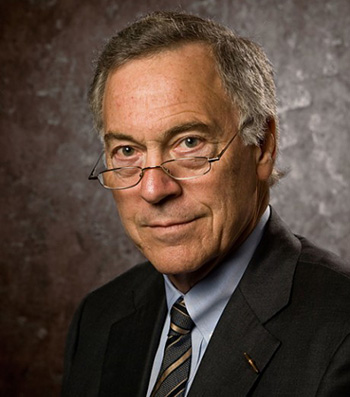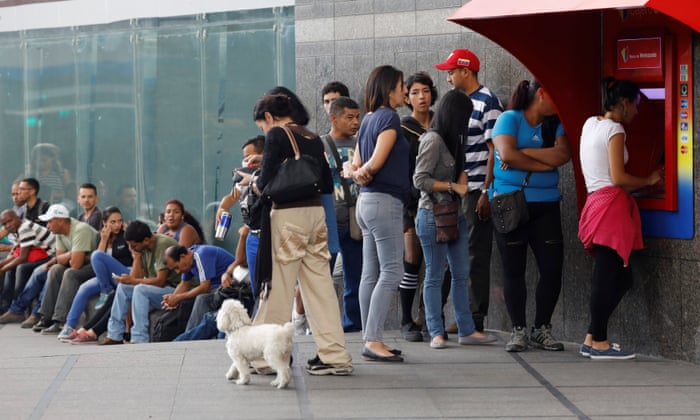Venezuela’s currency, the bolívar, is named after Simón Bolívar, the 19th-century hero revered across South America for leading the fight for independence from Spain. But the recent history of the banknote he inspired is far less glorious: low-value notes have been rendered practically worthless – and now Venezuela is running out of them.
The cash crunch is so acute that ATMs now provide a daily limit of 10,000 bolívars, enough to buy just a few cups of coffee. Black-market money changers charge commissions of up to 20% to score paper money for small business people who pay their workers in cash. Banks are running out of banknotes.
“Sometimes, bank tellers will only pay you half of your pension and suggest that you come back later for the rest,” said Marta Milano, who was waiting in a long line outside a state-run bank in Caracas hoping to collect her pension.
Although many nations are moving away from paper money in favor of electronic payments – for convenience and to reduce street crime – critics contend that Venezuela is inadvertently turning into a cashless society thanks to economic blunders by President Nicolás Maduro’s socialist government.
Out-of-control state spending, government currency controls and other policies have led to what many describe as hyperinflation, as well the collapse of the bolívar – which now trades at about 107,000 to the pound on the black market.
Now, there is not enough cash in circulation to keep up with soaring prices.
Jean Paul Leidenz, a senior economist at the Caracas thinktank Ecoanalítica, says there are about 13bn banknotes in circulation in Venezuela. But about half of these are 100-bolívar notes, each worth a small fraction of one penny.
The central bank has introduced higher-denomination bills, including a 100,000-bolívar note. But these new banknotes are printed in Europe and the government, which is dealing with falling production of oil – its main export – and massive foreign debt, lacks the money to import enough of them to meet demand.
“Prices are doubling around every two months. So at that rate of price increases you can’t keep up with inflation even if you start importing bills,” Leidenz says.
He and other analysts are calling for market reforms, including the lifting of government currency controls, to help combat inflation and boost national production amid Venezuela’s worst economic crisis in modern history. But the Maduro government has made no effort to change tack.
President Maduro blames the cash shortage on private bankers who he claims are working in cahoots with President Juan Manuel Santos of neighbouring Colombia, who has criticized Maduro for cracking down on democratic freedoms.
Maduro insists that bankers are smuggling cash across the Venezuelan-Colombian border as part of an elaborate conspiracy to sabotage the economy and bring down his government.
“Juan Manuel Santos of Colombia along with the [border] mafias are leading this attack against Venezuela. They are stealing 50- and 100-bolívar banknotes to take them out of the country,” Maduro said in a recent speech.
He did not, however, explain why smugglers would covet nearly worthless banknotes or why spiriting them out of the country would threaten the Venezuelan economy.
Instead, Maduro tried to paint the cash crisis as an opportunity for Venezuela to ditch cash altogether. He said that by next year, up to 95% of all payments in Venezuela should be done electronically.
That’s already starting to happen, though critics point out that the transition stems from a dearth of cash rather than ahead-of-the-curve planning by the Maduro government. These days, Venezuelans pay for the smallest purchases – from a pack of gum to newspapers – with credit or debit cards.
At an outdoor produce market in Caracas, electrician Edinson Sua whipped out his debit card to pay for a few kilos of potatoes and carrots. He said he saves his scarce bolívar notes for bus fares and other transactions that require cash.
“I almost never use cash except in a real emergency,” he says.
But paying with plastic creates new problems. The rising number of electronic transactions can cause internet connections for card readers to collapse. Empty shelves at supermarkets prompt many Venezuelans to seek out black-market vendors who sell milk, rice and other basic staples but accept only paper money.
What’s more, about 40% of Venezuelans do not have bank accounts. For them the daily scramble for cash continues.



0 responses on "Cash crunch: how Venezuela inadvertently became a cashless economy"